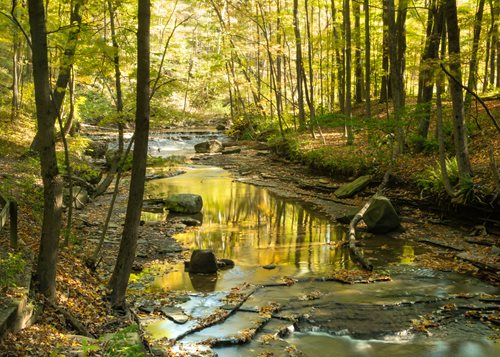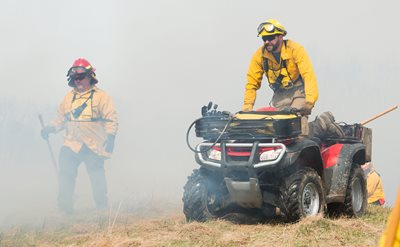Natural Resources - Mission
The mission of the Natural Resources Division is guided by Cleveland Metroparks primary responsibility for the conservation of natural resources:
The Board of Park Commissioners may acquire lands either within or without the Park District for conversion into forest reserves and for the conservation of the natural resources of the state, including streams, lakes, submerged lands, and swamplands, and to those ends may create parks, parkways, forest reservations, and other reservations and afforest, develop, improve, protect, and promote the use of the same in such a manner as the board deems conducive to the general welfare.
Cleveland Metroparks is committed to maintaining the health and diversity of the natural resources within the Park District by:
- Appropriately managing native plant and wildlife populations to promote balanced and naturally functioning ecosystems
- Identifying, protecting, and managing endangered species and habitats within the Park District
- Substantially improving water quality within the Park District through monitoring and advocacy of appropriate improvement measures
- Promoting fisheries in appropriate bodies of water within the Park District
Protecting the Resources
Healthy, functioning ecosystems provide services for a healthy, functioning human society. While this statement is clear from the perspective of ecology, it is not always apparent in human-dominated landscapes where issues related to the day-to-day repair and maintenance of our built infrastructure (e.g. water, wastewater, transportation, energy) appear separated from natural ecosystem processes.
Naturally functioning and sustainable ecosystems provide services that support human activities in the region. For example, forests, wetlands, and natural lakes slow storm water runoff and reduce flooding while also providing habitat for native plants, mammals, birds, amphibians, and fish.
Replacing natural infrastructure with human engineered infrastructure requires a large initial development investment and perpetual repair and replacement costs from human society. Protecting, conserving, and restoring natural ecosystem structure and function represent a cost-effective way to maintain and improve the benefits humans derive from the ecosystems they inhabit.
Cleveland Metroparks provides leadership in protecting existing and also additional open space throughout Northeast Ohio with special attention to areas adjacent to existing reservations. Through partnership, cooperative efforts, and the support of other agencies, the Park District aggressively pursues the protection of the remaining major river valleys within the seven counties of the Northeast Ohio region. To this end, the Natural Resource Division assists with the evaluation of tracts of land that are candidates for protection through acquisition, easement, or other means.
Natural Resources - Staff
- Jennifer Grieser, Director of Natural Resources

- Melissa Richter, Administrative Coordinator
- Erik Shaffer, Natural Resources Area Manager South
- Josh Philipps, Natural Resources Area Manager East
- Valerie Carter-Stone, Natural Resources Area Manager Central
- Jim Spetz, Natural Resources Area Manager West
- Mike Durkalec, Aquatic Biologist
- Constance Hausman, PhD, Senior Conservation Science Manager
- Jon Cepek, Wildlife Ecologist
- Andrew Burmesch, Wildlife Management Coordinator
- John Reinier, Wetland Ecologist
- Nathan Byer, PhD, Research and Database Manager
- Sarah Eysenbach, Vegetation Research Coordinator
- Andrew Haugh, Invasive Plant Coordinator
- Claire Weldon, Aquatic Research Coordinator
- Sara Corrigan, Watershed Volunteer Program Coordinator
- Elizabeth Hiser, Stream Restoration Ecologist
- Adam Regula, Climate Resilient Forest Manager
- Jen Brumfield, Natural Resources Coordinator
- Anthony Casey, Aquatic Invasive Species Project Coordinator
